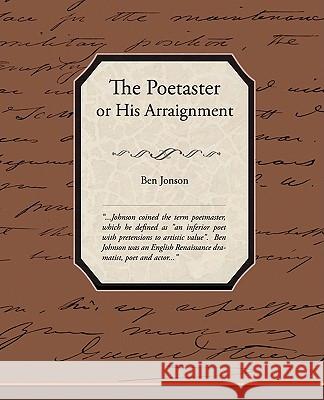The Poetaster or His Arraignment » książka
The Poetaster or His Arraignment
ISBN-13: 9781438504452 / Angielski / Miękka / 2008 / 312 str.
Johnson coined the term poetmaster, which he defined as "an inferior poet with pretensions to artistic value." Ben Johnson was an English Renaissance dramatist, poet and actor. He is known for his satirical plays such as Volpone, The Alchemist, and Bartholomew Fair. Johnson was a great reader and lover of controversy. Johnson had an unparalleled breadth of influence on Jacobean and Caroline playwrights and poets. In 1616 he received an annual pension, making him the first Poet Laureate of England. Poetmaster (1601) satirizes both John Marston, who Johnson believed had accused him of lustfulness, probably in Histrio-Mastix, and Thomas Dekker, against whom Johnson's animus is not known. Dekker responded with Satiromastix, subtitled "the Untrussing of the Humorous Poet." The final scene of this play offers a caricature that is recognizable as Johnson boasting about himself and condemning other poets, criticizing actors' performances of his plays, and calling attention to himself in any available way. The war of the authors ended peaceably with Johnson and Dekker collaborating on a pageant welcoming James I to England in 1603,
Johnson coined the term poetmaster, which he defined as "an inferior poet with pretensions to artistic value". Ben Johnson was an English Renaissance dramatist, poet and actor. He is known for his satirical plays such as Volpone, The Alchemist, and Bartholomew Fair. Johnson was a great reader and lover of controversy. Johnson had an unparalleled breadth of influence on Jacobean and Caroline playwrights and poets. In 1616 he received an annual pension, making him the first Poet Laureate of England. Poetmaster (1601) satirizes both John Marston, who Johnson believed had accused him of lustfulness, probably in Histrio-Mastix, and Thomas Dekker, against whom Johnson’s animus is not known. Dekker responded with Satiromastix, subtitled "the Untrussing of the Humorous Poet." The final scene of this play offers a caricature that is recognizable as Johnson boasting about himself and condemning other poets, criticizing actors performances of his plays, and calling attention to himself in any available way. The war of the authors ended peaceably with Johnson and Dekker collaborating on a pageant welcoming James I to England in 1603,











